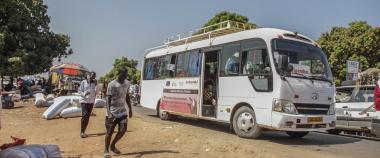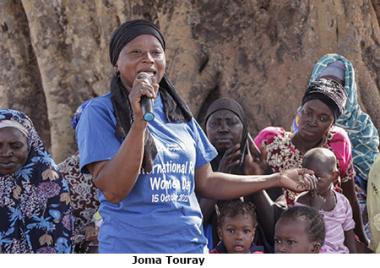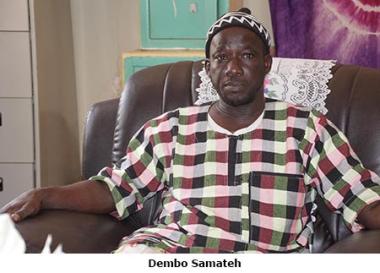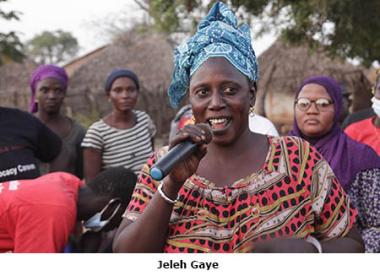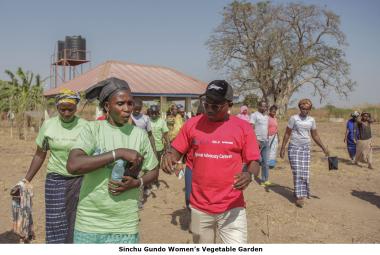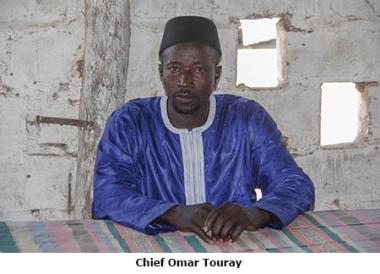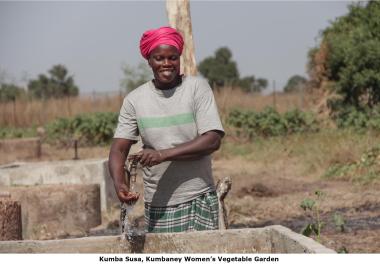Advocacy Caravan on CRSA for Food Security
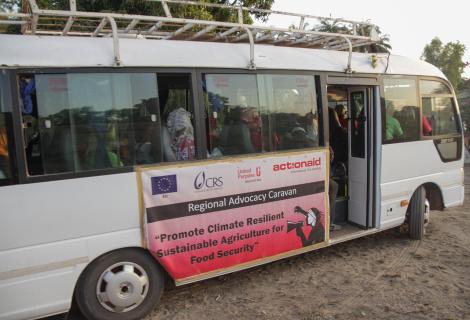
Advocacy Caravan: Promoting Climate Resilient Sustainable Agriculture for Food Security
The impact of climate change both anthropogenic and natural disasters including environmental degradation, erratic rainfall, bush fires, windstorms, flash floods pest & diseases outbreak, unsustainable farming practices, have affected the agricultural sector, contributing to food insecurity, and posing serious threat to the lives and livelihoods of people living in poverty particularly women.
ActionAid International The Gambia, Catholic Relief Services and United Purpose embarked on a second regional advocacy caravan under the project: ‘Empowering Civil Society Organizations to Mobilize Citizen Actions towards Green Economy and Environmental Sustainability’, funded by the European Union.
The caravan is a follow-up to some of the issues raised during the first regional advocacy caravan in May this year, which include deforestation, migration, bush fires, charcoal burning and other climate related hazards, with more emphasis on promoting Climate Resilient Sustainable Agriculture (CRSA), through the application of indigenous knowledge and best farming practices for food security.
The caravan team comprised of smallholder farmers from different regions, members of the Rural Women Assembly and other partner organisations, targeting mainly communities within North Bank and Central River North and South Regions.
In Sami Kuta village, Joma Touray, one of the beneficiaries of the ‘Green Economy’ Project thanked ActionAid, the European Union and the implementing partners of the project for providing solar power to their community. She said: “The provision of the solar has helped to improve our children’s performance in school because they are able to read their lessons at night”. Since the caravan is advocating for Climate Resilient and Sustainable Agriculture for Food Security, the women of Sami Kuta appealed for support in their village garden. According to Kaddy Demba, the women have a vegetable garden, but it is not fenced and there is no access to water in the garden. Sometimes stray animals destroy their vegetables.
The caravan team also held a brief meeting at the office of the Governor of North Bank Region. Fatou Touray, a member of the caravan team said that irregular migration has affected North Bank Region more than any other region in The Gambia, and this has affected the labour force especially when it comes to food production. Jainaba Njie, another member of the team said: “There are herdsmen and pastoralists coming from a neighbouring country with their cattle and other livestock for grazing in our forests and they end up cutting down our trees to feed their animals, and they also steal our livestock when going back”.
Responding to the caravan team on behalf of the Governor, the Deputy Governor, Dembo Samateh said that the office of the Governor is committed to women empowerment and he often calls himself ‘Self-appointed Women’s Lawyer’. Deputy Governor Samateh promised to take stern action against the pastoralists who are cutting down trees from the communities and also stealing their livestock.
In Baati Haye village in CRR South, Jeleh Gaye said that once upon a time in her village, there was a dense forest that was the abode of many wild animals but all of them have disappeared due to rampant cutting down of trees for firewood and charcoal. She said that they are working hard to restore and preserve their community forest for the benefit of their children tomorrow. She also expressed gratitude on the ‘Green Economy’ project which provided solar power to some households in the village.
In CRR South, the team visited the Women’s Vegetable Garden in Sinchu Gundo village in Niamina East. ActionAid started supporting the garden about eight years ago through the European Union funded project titled: ‘Promoting Women’s Socio-economic Rights. The garden was provided with a fence, wells, a toilet, and a waiting shed. Subsequent EU-funded projects like ‘Strengthening Women’s Economic Initiatives and the current ‘Empowering Civil Society Organizations to Mobilize Citizen Actions towards Green Economy and Environmental Sustainability’ further strengthened the women garden with the provision of a borehole, solar power, taps, reservoirs, and multiple trainings on gardening, composting and making pesticides from neem tree leaves. Saidina Alieu Jarju, ActionAid’s Fundraising Manager said: “ActionAid has been supporting the Sinchu Gundo garden for a very long time and we want to see women intensify their vegetable production so that there is all-year-round production in the garden for food security in Niamina”
The President of the garden Hawa Jawo said that the women of Sinchu Gundo never had a garden in the village until ActionAid came to their aid. “The women of Sinchu Gundo will forever be grateful to ActionAid and the European Union for the support. As you can see, we are working tirelessly because we know how important this garden is to us and our families” said Hawa.
The team also had a brief stopover at the Jareng ‘Lumo’ (weekly market) sensitizing the community to the impact of climate change and how cutting down of trees, charcoal burning, illegal sand mining, and other climate related hazards are contributing to environmental degradation.
The caravan team concluded their tour with two successful meetings at the residence of the Chief of Niamina East and the women of Kumbaney Vegetable Garden.
Chief Omar Touray, who now took over the chieftaincy from his father Alhaji Kebba Touray due to old age, promised to follow his father’s footsteps to work with ActionAid to empower the women of Niamina East. Chief Touray said: “When you empower a woman, you have empowered a man. My father was the first to include women in his District Tribunal. Therefore, I will strengthen what he has started. ActionAid’s work on women empowerment in Niamina has been exemplary. I therefore thank ActionAid for their good work in the district, and we will continue to work together to put an end to the rampant cutting down of trees, widespread bushfires, and charcoal burning”.
Like Sinchu Gundo garden, Kumbaney Women’s Vegetable Garden was also supported by all the three EU-funded projects geared towards women empowerment. The women recall some of the hardships they went through prior to ActionAid’s intervention. “We used to collect logs from the bush to fence the garden in order to keep away stray animals. Access to water was a big problem. I used to get a ladder myself and climb down the well to dig it so that we can get water to water our vegetables. But today, we thank God, ActionAid provided us with a borehole, solar power, a toilet, a waiting shed and this multipurpose centre with refrigerators to sell ice blocks, we charge our mobile phones here and we also operate a video club” said Kumba Suso, a prominent member of the garden.
